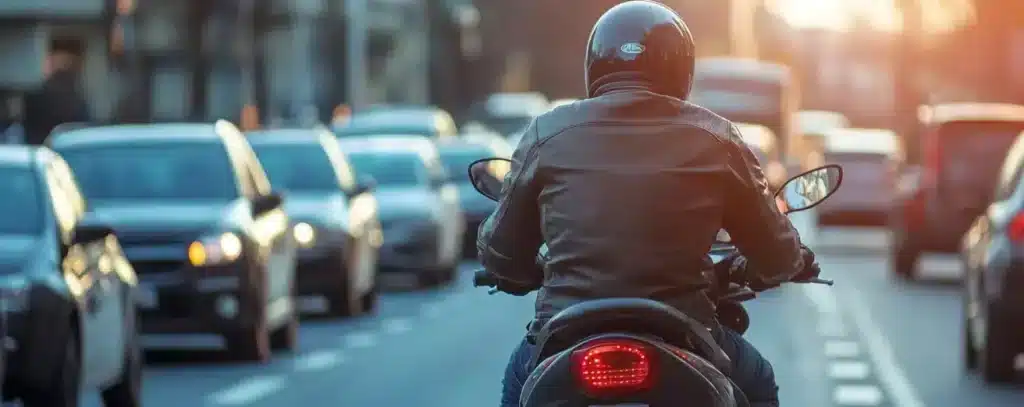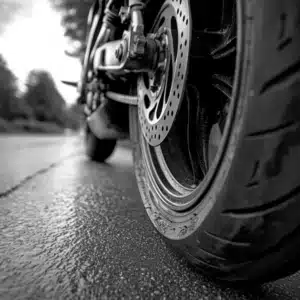Is Lane Filtering Legal in Indiana? Find Out Here!
Last updated Wednesday, February 19th, 2025

Is lane filtering legal in Indiana? No, it’s not permitted. This article will explain the legal reasons, potential risks, and consequences of lane filtering for motorcyclists in Indiana.
Key Takeaways
- Lane filtering is illegal in Indiana, as state laws do not permit motorcyclists to bypass traffic between lanes.
- Engaging in lane filtering poses significant safety risks and can lead to legal repercussions, including being deemed at fault in accidents.
- Motorcyclists involved in lane-filtering accidents should seek medical assistance, exchange insurance information, and consult an attorney to navigate legal complexities.
Understanding Lane Filtering
Lane filtering is a practice where motorcyclists advance between lanes of traffic at low speeds to bypass congestion. Often confused with lane splitting, which involves riding between lanes of slow-moving or stopped traffic, lane filtering occurs typically at lower speeds and is prevalent in urban areas of Europe and Asia.
In these regions, lane filtering is not only a common expectation but is also seen as a practical measure to reduce fuel consumption and lower carbon emissions by preventing motorcycles from idling in traffic. The benefits of lane filtering in such congested urban settings are evident, yet its application and acceptance can vary significantly across different jurisdictions.
Motorcyclists need to grasp the differences between lane filtering and lane splitting, particularly regarding legalities and safety concerns. Keep these definitions and their implications in mind as we dive into Indiana’s traffic laws, especially since lane-splitting laws vary surrounding lane split.
Indiana’s Stance on Lane Filtering
Indiana’s legal stance on lane filtering is clear: it is not permitted. This prohibition aligns with the state’s position on lane splitting, making lane splitting illegal under current traffic laws. Unlike some states where lane splitting is legal, Indiana lacks legal provisions that would allow motorcyclists to filter or split lanes.
The state’s traffic laws mandate that vehicles must not restrict other vehicles from fully utilizing their lanes. This regulation effectively prevents motorcyclists from legally engaging in lane filtering or motorcycle lane splitting.
The absence of specific legal recognition for these practices means that motorcyclists must adhere to the same lane usage rules as other vehicles, occupying a full lane and not encroaching on traffic lanes occupied by other vehicles.
Motorcyclists in Indiana must recognize these legal boundaries. Engaging in lane filtering poses both safety risks and legal consequences, which are detailed in the following sections.
Reasons Motorcyclists Might Filter Lanes
Though illegal, many motorcyclists might still be tempted to filter lanes for various reasons. One primary motivation is the desire to avoid traffic jams and reduce travel time. In heavy traffic conditions, lane filtering offers a way for riders to navigate through stalled or slow-moving vehicles, potentially making their commute much quicker.
Another reason is safety. Lane filtering can provide an escape route for motorcyclists, preventing them from being trapped between larger vehicles in congested traffic scenarios. This maneuver can reduce the risk of rear-end collisions, which are particularly dangerous for motorcyclists.
However, some riders may engage in lane filtering without realizing that it is illegal in Indiana. Others might be aware of the legal risks but choose to filter lanes when they are in a rush or feel it is the safest option in a given situation. These reasons, while compelling, must be weighed against the associated risks and legal consequences.
Risks Associated with Lane Filtering
Lane filtering in Indiana poses significant risks, not just for motorcyclists but for other motorists and other drivers on the road as well. Close proximity to other vehicles increases accident likelihood, with hazards such as side-view mirrors, sudden lane changes, and obstacles like pets or children. These risks are exacerbated in heavy traffic, where quick maneuvers can easily lead to collisions.
While some studies suggest that lane filtering might reduce the chances of motorcyclists being rear-ended, this benefit must be carefully balanced against the increased risk of side-impact collisions and other accidents. Filtering lanes in close proximity to other vehicles raises serious safety concerns.
It’s clear that while lane filtering might offer some advantages in terms of avoiding rear-end collisions, the overall danger it poses significantly outweighs these benefits. Motorcyclists must be aware of these risks and consider safer alternatives when navigating through traffic.
Legal Consequences of Lane Filtering in Indiana
Lane filtering in Indiana can lead to serious legal repercussions. Since the practice is illegal, motorcyclists caught in the act could face fines and other penalties. More importantly, if a lane filtering accident occurs, the motorcyclist is often deemed at fault, which can have significant implications for liability and insurance claims.
In the context of an accident, being found at fault due to illegal lane filtering can be particularly damaging. It can lead to higher insurance premiums and reduced chances of successfully claiming damages for injuries or vehicle repairs. The perception of negligence associated with lane filtering further complicates the motorcyclist’s legal standing and ability to seek compensation.
Motorcyclists must understand these legal consequences. Engaging in lane filtering not only endangers their safety but also carries substantial legal risks that can affect their financial and legal well-being.
What to Do If You’re Involved in a Lane Filtering Accident
In the event of a lane filtering accident, immediate and appropriate actions are crucial. First and foremost, seek medical assistance promptly, as some injuries may not be immediately apparent. Health and safety come first, and a professional medical evaluation ensures proper diagnosis and treatment of any injuries.
Exchange insurance and contact details with all involved parties. This information is essential for proving claims and navigating the insurance process. Additionally, documenting the accident scene with photos and gathering witness statements can be invaluable for your case.
It’s highly recommended to consult an attorney experienced in motorcycle accidents. An attorney can help gather evidence, determine fault, and guide you through the complexities of filing an insurance claim or pursuing legal action. Proving fault can be challenging due to the illegal status of lane filtering in Indiana, making legal representation essential.
Seeking Compensation for Lane Filtering Accidents
While complicated, seeking compensation after a lane filtering accident is possible. Victims might claim compensation for medical expenses, vehicle repairs, lost wages, and emotional distress. If another party’s negligence contributed to the accident, you might have a valid claim for various damages.
Winning a personal injury lawsuit related to a lane-splitting accident can yield significant compensation for medical expenses, lost wages, and pain and suffering. However, the illegal nature of lane filtering in Indiana can complicate these claims, making it harder for motorcyclists to successfully obtain compensation.
Given these challenges, seeking legal advice and representation is crucial. An experienced attorney can help navigate the complexities of your case, ensuring that you receive the compensation you deserve despite the hurdles posed by the illegality of lane filtering.
How Isaacs & Isaacs Can Assist After a Lane Filtering Accident
Isaacs & Isaacs can provide invaluable assistance after a lane filtering accident. Our team will thoroughly investigate the incident, examining all available evidence to determine fault. This meticulous approach is crucial for establishing negligence and ensuring you receive fair compensation.
We will handle all aspects of your claim, from filing paperwork to negotiating settlements. Consulting Isaacs & Isaacs before accepting any settlement offer can protect you from inadequate compensation and ensure your rights are fully upheld. If necessary, we are prepared to represent you in court to fight for the compensation you deserve.
Engaging Isaacs & Isaacs means having a dedicated team on your side, guiding you through the legal process, and helping to prove causation and damages in your personal injury lawsuit. Our goal is to ensure that you are fully compensated for your injuries and losses.
Frequently Asked Questions
Is lane filtering legal in Indiana?
Lane filtering is illegal in Indiana, meaning motorcyclists must follow the same lane usage rules as other vehicles.
What are the risks associated with lane filtering?
Lane filtering increases accident risks such as side-impact collisions and proximity hazards, jeopardizing the safety of both motorcyclists and other road users. Therefore, awareness and caution are essential while lane filtering.
What should I do if I am involved in a lane filtering accident?
If you are involved in a lane filtering accident, seek medical attention right away and ensure you exchange contact and insurance information with the other party. Additionally, document the accident scene and consider consulting an attorney for legal advice.
Can I seek compensation if I am injured in a lane filtering accident?
Yes, you can seek compensation for injuries from a lane filtering accident, but it may be complex due to the legality issues. Consulting an experienced attorney is essential to effectively navigate the process and advocate for your claim.
How can Isaacs & Isaacs assist me after a lane filtering accident?
Isaacs & Isaacs can assist you by thoroughly investigating the accident, determining fault, managing your claim, negotiating settlements, and representing you in court if needed, ensuring you receive fair compensation.












